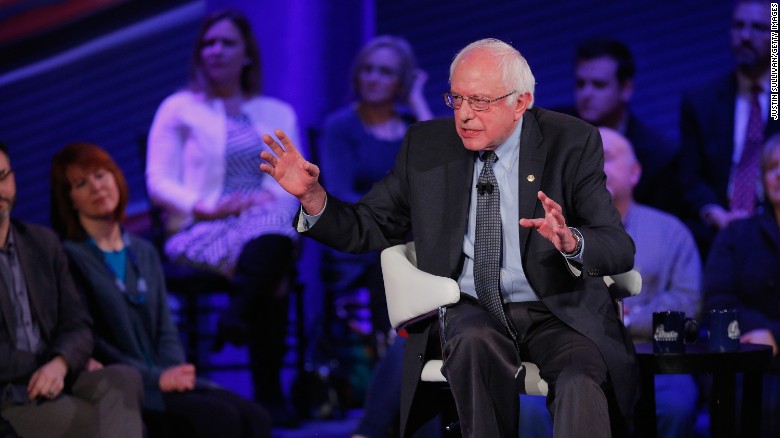Poll: Clinton tops Sanders, but lead shrinks
A majority of Democratic voters say Hillary Clinton is their top choice in the race for their party's nomination, but her margin over Bernie Sanders is smaller than it has been at any point since before the field narrowed to three.
According to a new nationwide CNN/ORC Poll, Clinton tops Sanders 52% to 38% among registered voters who are Democrats and Democratic-leaning independents. Former Maryland Gov. Martin O'Malley is far behind the two top candidates at just 2%.
Though Clinton's lead over Sanders remains in double-digits, these figures represent the tightest the contest has been since early September. Back then, before Vice President Joe Biden had opted out of the race and before the remaining Democratic field ever took to a debate stage, Clinton topped Sanders by just 10 points.
Full results: CNN/ORC poll
The poll findings come as the three remaining Democratic candidates prepare to make their final pitches to Iowa voters in a town hall set to air on CNN Monday night.
Though the national picture tilts in Clinton's direction, according to this poll, other recent surveys in Iowa and New Hampshire -- the two states hosting the first contests of the 2016 nomination battle -- suggest Clinton will face an uphill climb in trying to grab an early victory. Iowa polls find the top two Democrats near-even among that state's likely caucus-goers, while Sanders has something of a home-field advantage in New Hampshire and tops Clinton there handily.
The national survey shows a Democratic electorate sharply splintered along demographic lines.
Women, non-whites, self-identified Democrats and those over age 50 are Clinton's strongest backers. Men, white voters, independents who lean Democratic and younger voters are more apt to say they plan to support Sanders.
Only independents and younger voters, however, give Sanders a significant edge over the former secretary of state. Men and white voters are about evenly split between the two.
Clinton is widely seen as better able to handle four issues tested in the poll, topping Sanders by 43 points as more trusted on foreign policy, 19 points on gun policy and 15 points each on the economy and health care.
But Sanders has gained significant ground on Clinton on health care, gun policy and even foreign policy since these questions were last asked in CNN/ORC polling in November or December. More broadly, the gap between the two candidates is far tighter when Democrats are asked to assess who better represents Democratic values. On that question, 48% choose Clinton, 42% Sanders.
Still, Clinton maintains a sense of inevitability. Nearly three-quarters of Democrats say they expect to see her name atop the party's ticket come November, including nearly half of those who say they support Sanders. She is also broadly viewed as having the better chance to win the general election: 71% of Democratic voters think Clinton has a better shot than Sanders.
Overall, the poll suggests Democratic voters would be content should either Clinton or Sanders emerge as the nominee at the end of the nomination process.
While both Clinton's and Sanders' supporters express greater enthusiasm about the possibility that their favored candidate would lead the party in the general election, most say they would still be satisfied if the other candidate won. Six-in-10 Clinton backers would be satisfied or enthusiastic if Sanders won, and 54% of Sanders backers would be satisfied or enthusiastic if Clinton won.
Both candidates enjoy broadly positive favorability ratings among Democrats (80% view Clinton favorably, 79% Sanders).
The poll also finds Democratic voters broadly focused on economic issues and health care: More than 8 in 10 say the economy (86% "extremely" or "very" important), the income gap between rich and poor (83%), and health care (83%) are critical to their vote for president this year.
The CNN/ORC Poll was conducted by telephone January 21-24 among a random national sample of 1,002 adults. Results for the full sample have a margin of sampling error of plus or minus 3 percentage points. For results among the 440 registered voters who are Democrats or independents who lean toward the Democratic Party, the margin of sampling error is plus or minus 4.5 percentage points.
News Courtesy: www.cnn.com











